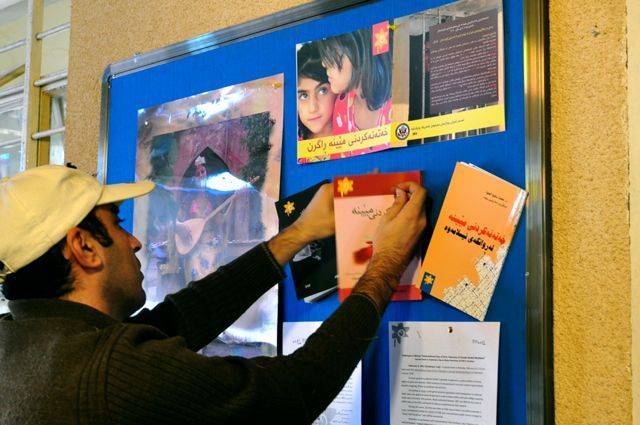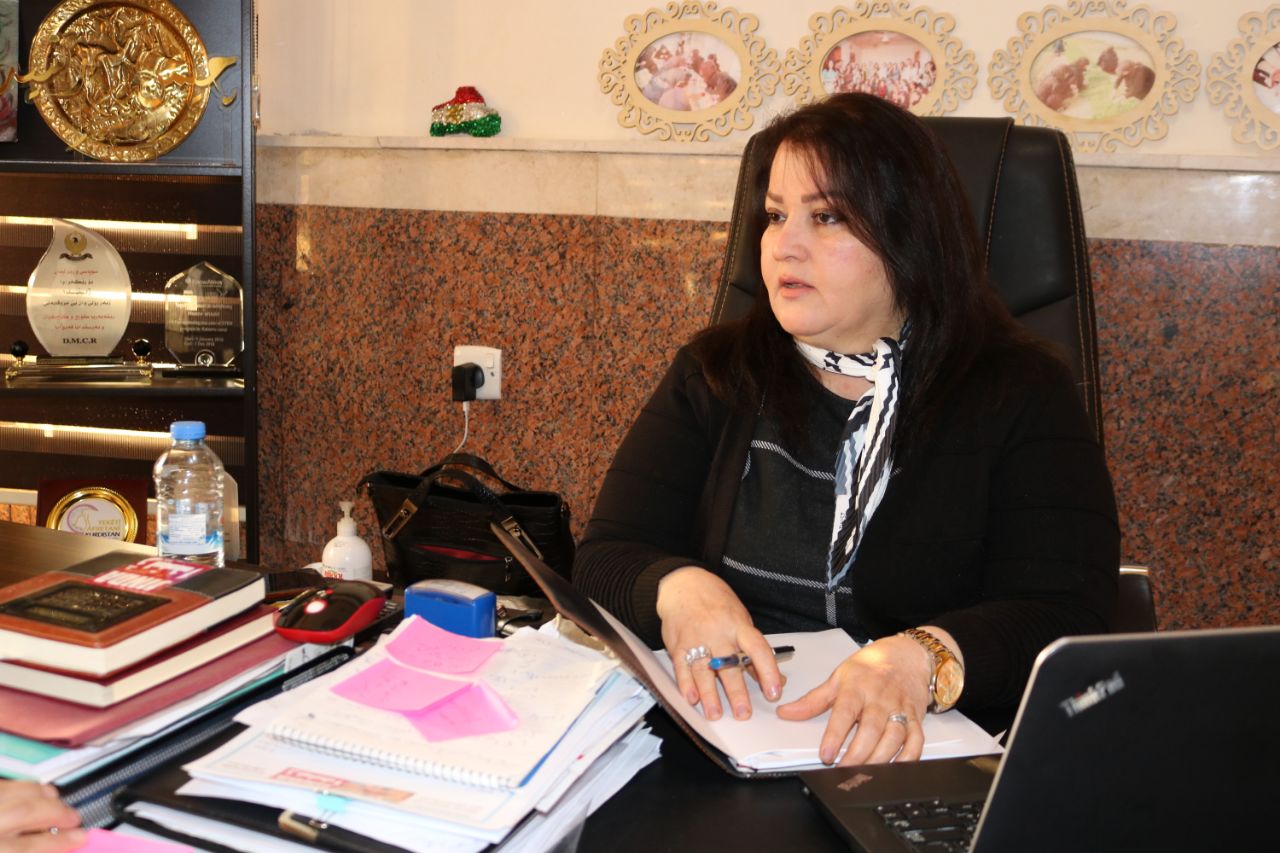A German aid organization seeks to transfer its experience in the field of combating female genital mutilation FMG from the Iraqi Kurdistan Region to the other parts of Iraq with the aim of eradicating this phenomenon in society and banning it within the framework of the law.
The experience of the organization in the provinces of Kurdistan Region extends for more than 15 years, during which it succeeded in ending the phenomenon of female circumcision in the areas of Halabja and Garmian.
The new campaign of Wadi in Iraq will start on February 6, 2022, which coincides with the International Day against Female Genital Mutilation FMG, and the doors of the campaign are wide open to any organization or party that wishes to support and participate in the campaign.
Thomas von der Osten-Sacken, Director General of Wadi, told KirkukNow, "The new campaign is to encourage people and society to reject FGM, through two main demands, one of which is a study by the organization and secondly their efforts be transferred to the Iraqi parliament to ban this practice by law."
Wadi, which means valley in Arabic, Association for crisis Assistance and Development Cooperation, is supporting various projects to empower women and youth in the Middle East since 30 years.
Wadi was founded in the fall of 1991 by various organizations and individuals. The original idea was to found an umbrella organization that coordinates and bundles the activities of various groups and people active in Iraq and Kurdistan.
Its main projects covers rehabilitation for long-term prisoners, literacy programs, education and training for women, public awareness of and fight against domestic violence as well as campaigns against FGM

Wadi has been working for 15 years against the phenomenon of female genital mutilation FMG in the Kurdistan Region. Credit of Wadi
A previous study conducted by the United Nations UN in 2011 indicated that the rate of female circumcision in northern Kurdistan Region exceeds 44% compared to less than 1% in other Iraqi provinces in the middle and south.
Wadi criticizes this study and calls for a new study because it believes that the "real percentage of female circumcision" appeared in the Kurdistan Region as a result of Wadi's efforts and continuous work on this issue, while the issue was not raised in the rest of Iraq and the real percentage of that practice remained a secret.
Thomas told KirkukNow that because of the study conducted by the United Nations, the world has come to believe that female circumcision is practiced in the Kurdistan Region only and that this phenomenon is non-existent or rare in other parts of Iraq, “while things are not like this, the phenomenon of female circumcision is common in Baghdad, Babylon and other parts of Iraq.”
"If circumcision is common only among the Kurds, then why the big number of Kurds living in Baghdad don't practice female circumcision, as UN study says that the percentage is very low there? So this problem has nothing to do with a particular ethnicity, but rather it is common in all parts of Iraq. "
Wadi has been working for 15 years against the phenomenon of female genital mutilation FMG in the Kurdistan Region. Credit of WADI
The director of the Wadi says that studies conducted by the organization in Dohuk province, whose residents are also Kurds, showed percentage of female circumcision is very low, but there is evidence and information that female circumcision is practiced in Baghdad, Kirkuk, Babil and Khanaqin.
Thomas hinted UN had earlier considered female genital mutilation a widespread phenomenon in Africa. "It took us seven years to be able to convince the United Nations that this phenomenon also exists in Iraq."
It took us seven years to be able to convince the United Nations that this phenomenon also exists in Iraq
In 2010, Wadi conducted an extensive study in the Kurdistan Region to find out the rate of female circumcision, which in some areas reached 70%. Two years later, the organization published the results of a study conducted in Kirkuk province.
According to the study conducted in Kirkuk, in which more than a thousand girls and women participated, it was found that the percentage of women and girls who were subjected to FGM reached 38%, the majority of them are Kurds, followed by Arabs and then Turkmens of both sects, Sunni and Shiite, but no cases of FGM were recorded among Christians.
The Northern oil-rich city of Kirkuk, located 238 kilometers north of Baghdad, is an ethnically mixed province for 1,7 million Kurds, Arabs, and Turkmens, Sunnis and Shiites, besides Christians and Kakais. It has long been at the center of disputes between Baghdad and the Erbil.
The results of the study and the information collected in other regions such as Baghdad and Babylon prove that the phenomenon exists in other Iraqi provinces for which Wadi is trying in cooperation with activists, organizations, government and parliament to confront the problem.
In 2005, WADI launched the "Stop Female Genital Mutilation" campaign in the Kurdistan Region and banning this phenomenon within the framework of the law is part of the achievements of that campaign.
According to the law to stop domestic violence, endorsed by the Kurdistan Parliament in 2011, female circumcision is a form of violence punishable by up to three years in prison and a fine of up to 10 million dinars.
Wadi launched Stop FMG campaign in Germian, suburbs south of Sulaymaniyah Northern province, and some other areas in 2015. In 2018, only 29 cases were recorded in the the Region.
As per Wadi figures, not a single case of FMG was recorded in Germain in 2019, however, 161 cases were recorded in Erbil and 162 in Ranya, northwest of Sulaymaniyah.
On February 6, 2020, Wadi organization in cooperation with Netherland Consulate arranged a conference on the International Day of Zero Tolerance for FMG in which they announced that Germian region free of FGM.
Chiman Rashid, Director of Wadi projects in Dohuk, believes, "Iraqi society needs preparation and proper ground in order to convince people of the necessity for rejecting female circumcision, for which there is need for discussion and debate with religious figures, families, NGOs and the government, get people confidence and awareness campaigns about the harmful effects of female circumcision.”
There is no law in Iraq that prohibits or encourages female circumcision.
"I have talked to civil society organizations, and they replied the practice is taking place on a large scale in Iraq, but secretly," said Chiman, who believes that the time has come for FGM to be practically prohibited in other regions of Iraq, similar to the Kurdistan Region.
WADI adopts three strategies in combating FGM: spreading awareness, collecting data and working to eradicate the phenomenon in local communities.
Osten-Sacken says Wadi expects to face the same challenges it had faced in the Kurdistan Region during the transfer of that experience to other regions of Iraq, "but the difference is that we will not start from scratch. The Iraqi media is constantly working on preparing and publishing reports on the fight against female circumcision in the Kurdistan Region, therefore, the issue will not be new to people."
He hopes their campaign will reach the Iraqi parliament in a short time, and that female genital mutilation will be banned by law, as happened in the Kurdistan Region, and the campaign organizers are looking to ensure that they receive the support of Kurdish representatives in Baghdad at the very least.
Thomas is not afraid of the influence of the religious backgrounds of the majority of parliamentarians on efforts to ban and criminalize female circumcision, given that the campaign is based on the Islamic Hanafi school of thought, which considers circumcision to be optional and not obligatory, unlike the Shafi'i school.

Duhok, January 2022: Chiman Rashid, Head of Wadi office in Duhok. Ammar Aziz
The Anti-Domestic Violence Law has been sitting on the shelves of the Iraqi parliament for years and has not been approved yet, but the law did not specify any paragraph to prohibit female circumcision, contrary to the law issued in the Kurdistan Region.
Wadi director believes banning the phenomenon of female circumcision by law will have a major role in putting an end to the phenomenon because “people will join the efforts against female circumcision on a larger scale once they know its practice will have legal consequences.
He pointed out that Parliament is the one which will decide whether to add a paragraph on the prohibition of female circumcision to the draft law to combat domestic violence, or to draft and endorse a separate law.
A study by UN in Iraq conducted 2018 indicates over 7% of girls are subjected to FGM and it plans to put an end to this phenomenon by 2030.
Rashid thinks working across Iraq exposes them to many challenges, "because it is the first time that an organization tries to raise an issue that has been kept secret in society for thousands of years, at a time when women not only are not allowed to talk about such sensitive issues, yet even about their social problems."
"But we want to overcome all obstacles and challenges and implement the project," she added.
In addition to the new campaign, Wadi projects will continue in the Kurdistan Region, the phenomenon of female circumcision has not been eradicated in many cities, while the second part of the organization’s projects focuses on girls and women who have been subjected to circumcision to help them overcome the post-trauma effects of that practice and restore a normal life.
Wadi has led awareness campaigns about Covid-19 from the early beginning of the outbreak of the pandemic through its staff in cooperation with medical staff and its media partners. KirkukNow media outlet is one of WADI's partners.





